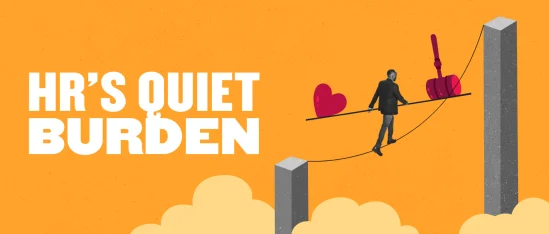It felt like we’d moved on. Like we’d found a new rhythm after the upheaval of COVID-19, that DEI&B had earned its place as a core business priority, and that we’d figured out what the future of work should look like. But HR knows better.
As we mark International HR Day this week, it’s clear that HR’s role is more demanding and vital than ever. While this day is meant to celebrate the people behind the people, this year, it’s also a reminder of the quiet burden HR carries, and how belonging-first strategies can help them lead through it.
HR’s invisible burden: Navigating the gray areas
Behind every organizational shift, HR is there. Behind every policy update, employee concern, or culture initiative, HR is there. And behind today’s debates around inclusion, values, and legality? Still HR.
In 2025, HR professionals are being asked to balance employee wellbeing, duty of care, company values, legal compliance, and public scrutiny—all while quietly carrying the weight of uncertainty themselves. They’re mediating between what’s best for people and what’s permitted by new policies. They’re absorbing stress, diffusing conflict, and doing their best to translate fear into something stable, actionable, and human.
HR has always been more than a support function. Now, more than ever, it’s business-critical leadership under pressure.
DEI&B is under fire—and so is HR
New executive orders in the US have significantly changed how DEI&B can be implemented, particularly for organizations tied to federal contracts. These policy changes have:
- Eliminated federal agency DEI&B programs (EO 14172)
- Revoked long-standing affirmative action requirements (EO: “Ending Illegal Discrimination and Restoring Merit-Based Opportunity”)
- Reframed diversity work as potentially noncompliant or risky
Even companies outside the direct reach of these mandates are feeling the effects. Legal uncertainty and public debate have made HR teams question what’s allowed, what’s defensible, and how to keep moving forward without compromising values or breaking the law.
This isn’t just a compliance issue; it’s a cultural and emotional one, and HR is stuck in the middle.
Between compliance and care: HR’s ethical balancing act
HR professionals are protectors by nature. But what happens when the systems they’ve built to support people come under scrutiny? What happens when inclusive practices suddenly feel fragile or politicized?
They’re expected to stay compliant—and stay human.
That’s a heavy ask. Many HR leaders are already feeling it in the form of burnout, self-censorship, or quiet stress, at a time when their own wellbeing is often overlooked. When DEI&B becomes a source of risk, HR teams often carry the burden of translating that risk into something their people can still believe in.
Here’s what HR teams can do now to protect their organizations and their integrity:
- Refresh outdated handbooks to reflect current legal realities while holding true to values
- Audit pay equity and DEI&B data handling to ensure fairness and defensibility
- Equip people managers with clear, empathetic talking points for tough conversations
DEI&B isn’t dead—it’s evolving. And smart HR teams are adapting to protect both their people and their purpose.
Recommended For Further Reading
What holds us together: Belonging-first strategies for complex times
Even when policy changes, belonging doesn’t have to.
Belonging is universal. It’s not about quotas, checklists, or slogans. It’s about how people feel in your workplace. Do they feel safe? Valued? Seen? Do they believe they have a future where they are?
HR leaders can build legally sound, emotionally meaningful strategies by designing inclusive experiences into every stage of the employee journey, without relying on mandates or checklists.
Here’s how:
- Shift to skills-based hiring to reduce bias while staying compliant
- Use anonymous surveys and engagement data to track inclusion sentiment over time
- Make use of flexible data fields in HR tech to meet regional legal needs while supporting identity expression
- Offer inclusive benefits and internal mobility that reflect a wide range of lived experiences
- Frame DEI&B as a shared value, not special interest—what makes people feel they belong benefits everyone
Psychological safety. Trust. Growth. These aren’t buzzwords: they’re retention strategies. And they’re all outcomes of doing belonging right.
HR is holding the line. Let’s hold space for them.
This International HR Day, let’s not just celebrate HR. Let’s see them.
Let’s acknowledge the strain of being the voice of care in a climate of caution. The weight of reconciling company values with political mandates. The reality of leading internal culture when the world outside is in flux.
HR is here to stay. And so is change. But at HiBob, we believe people-first strategies are still the most powerful lever for business growth, and we’ll continue building tools and guidance to help HR lead with clarity, compliance, and care.
We see you. We value you. We’re with you.
👇 Learn more:
Explore how Bob supports people-first workplaces—no matter what.
How to champion DEI&B in the age of social and legal resistance


